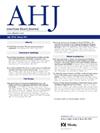Design and rationale of the HARTc 2.0 trial: A multicenter randomized controlled study on the impact of point-of-care high-sensitivity cardiac troponin-I testing in prehospital acute coronary syndrome triage on diagnosis and cost-effectiveness
IF 3.5
2区 医学
Q1 CARDIAC & CARDIOVASCULAR SYSTEMS
引用次数: 0
Abstract
Introduction
Chest pain accounts for ∼10% of emergency department visits, though most cases are not acute coronary syndrome (ACS), underscoring the need for effective prehospital triage. The HARTc 2.0 study evaluates the modified History, Electrocardiogram, Age, Risk Factors, and Troponin (HEART) score incorporating point-of-care (POC) high-sensitivity cardiac troponin-I (hs-cTnI) capillary fingerprick testing with sex-specific cut-offs to improve ACS risk stratification. The randomized controlled trial compares a prehospital triage strategy using this modified HEART score and a 0/2-hour POC hs-cTnI algorithm to standard care using HEAR score and in-hospital 0/1-hour hs-cTnT testing. Cost-effectiveness and diagnostic timing are also assessed.
Methods and Analysis
The HARTc 2.0 study consists of 4 prospective phases to improve prehospital risk stratification for patients with suspected ACS. Phase 0 investigates technical operability of the Siemens Atellica VTLi POC hs-cTnI device. Phase 1 verifies preanalytical and analytical performance. Phase 2 evaluates clinical comparability between modified HEART score (with POC hs-cTnI) and standard HEART score. Phase 3 is a multicenter randomized controlled trial assessing the impact of prehospital risk stratification—into low, intermediate, or high-risk for ACS—on clinical decision-making, time-to-diagnosis, and cost-effectiveness.
Conclusion
This trial evaluates modified HEART score with POC hs-cTnI testing, incorporating sex-specific cut-offs, to improve prehospital ACS risk stratification. Phases 0 and 1 confirm the reliability of capillary whole blood POC hs-cTnI. Furthermore, the trial is a randomized trial which evaluates prehospital risk stratification for ACS using a 0/2-hour POC hs-cTnI algorithm on clinical decision-making, time-to-diagnosis, as well as its cost-effectiveness. Improved prehospital risk stratification for ACS aims to enhance triage accuracy, time-to-diagnosis and time-to-treatment, thereby reducing unnecessary hospital admissions and improve resource allocation in prehospital and emergency care.
Trial Registration
NL80873.000.22, NL9475 (registered in the Dutch Trial Register, the Netherlands).
HARTc 2.0试验的设计和基本原理:一项多中心随机对照研究,研究院前ACS分诊中即时hs-cTnI检测对诊断和成本效益的影响。
简介:胸痛占急诊科就诊的约10%,尽管大多数病例不是ACS,强调需要有效的院前分诊。HARTc 2.0研究评估改良后的HEART评分,结合护理点(POC)高灵敏度心肌肌钙蛋白I (hs-cTnI)毛细血管点刺试验,并采用性别特异性切断,以改善ACS风险分层。随机对照试验(RCT)比较了院前分诊策略使用这种改进的HEART评分和0/2小时POC hs-cTnI算法与使用HEAR评分和院内0/1小时hs-cTnT测试的标准护理。还评估了成本效益和诊断时间。方法与分析:HARTc 2.0研究分为4个前瞻性阶段,旨在改善疑似ACS患者的院前风险分层。第0阶段研究西门子Atellica VTLi护理点(POC) hs-cTnI设备的技术可操作性。阶段1验证分析前和分析性能。第二阶段评估改良HEART评分(含POC hs-cTnI)和标准HEART评分的临床可比性。第3期是一项多中心随机对照试验,评估院前风险分层(低、中、高风险)对临床决策、诊断时间和成本效益的影响。结论:该试验通过POC hs-cTnI检测评估改良后的HEART评分,并纳入性别特异性切断,以改善院前ACS风险分层。第0期和第1期证实了毛细管全血POC hs-cTnI的可靠性。此外,该试验是一项随机试验,使用0/2小时POC hs-cTnI算法评估ACS的院前风险分层,包括临床决策、诊断时间及其成本效益。改进ACS院前风险分层旨在提高分诊准确性、诊断时间和治疗时间,从而减少不必要的住院,改善院前和急诊护理的资源分配。
本文章由计算机程序翻译,如有差异,请以英文原文为准。
求助全文
约1分钟内获得全文
求助全文
来源期刊

American heart journal
医学-心血管系统
CiteScore
8.20
自引率
2.10%
发文量
214
审稿时长
38 days
期刊介绍:
The American Heart Journal will consider for publication suitable articles on topics pertaining to the broad discipline of cardiovascular disease. Our goal is to provide the reader primary investigation, scholarly review, and opinion concerning the practice of cardiovascular medicine. We especially encourage submission of 3 types of reports that are not frequently seen in cardiovascular journals: negative clinical studies, reports on study designs, and studies involving the organization of medical care. The Journal does not accept individual case reports or original articles involving bench laboratory or animal research.
 求助内容:
求助内容: 应助结果提醒方式:
应助结果提醒方式:


